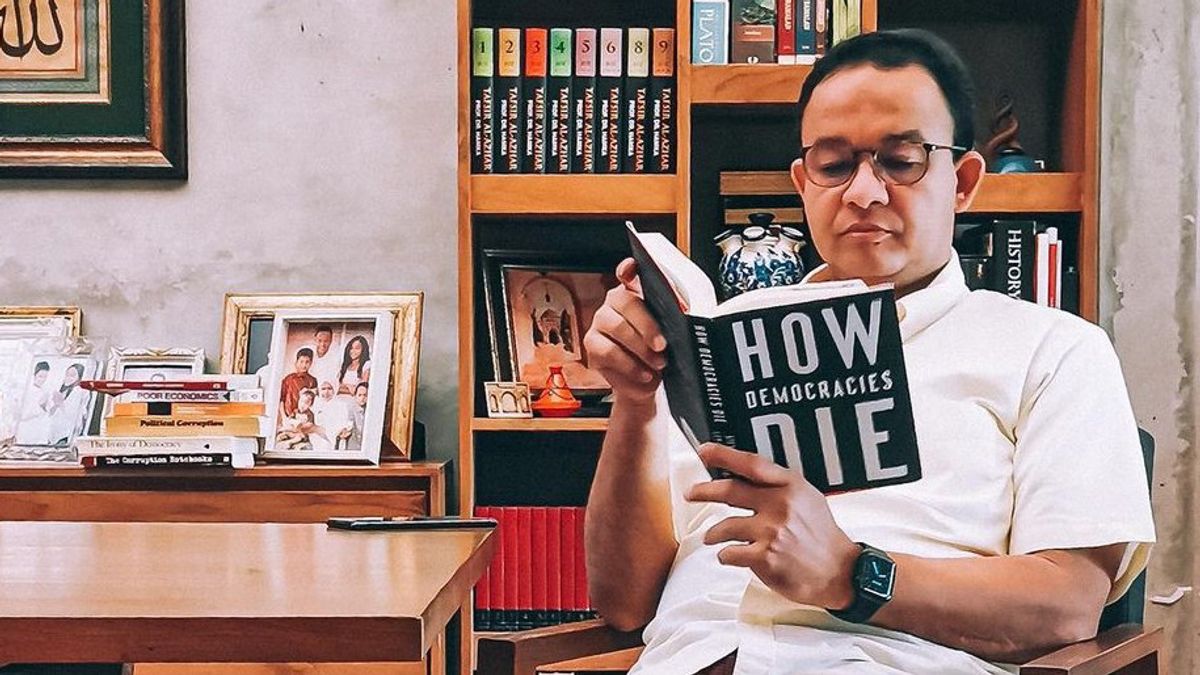JAKARTA - Anies Baswedan photo reading a viral book. Anies read a book entitled How Democracies Die was in the spotlight. The book by Steve Levitsky and Daniel Ziblatt has been interpreted by many as a criticism of Anies against the Indonesian government under Joko Widodo (Jokowi) administration. Actually, what is in the book How Democracies Die?
In the caption of the photo uploaded on his Twitter and Instagram accounts, Anies wrote, "Good morning everyone. Enjoy Sunday morning." The post was rewarded with various comments.
@ radityaputra1108, for example, who said, "The book looks like a code, huh."
Account @ akbar_salam1 interprets the same. "Incredible. Hard code."
How Democracies Die is a book released in 2018.The book contains research on new forms of authoritarianism in many countries of the world that were previously known to adhere to democratic systems.
Good morning everyone. Enjoy Sunday morning. pic.twitter.com/sBhF8k0UW0
- Anies Baswedan (@aniesbaswedan) November 22, 2020
The image of a populist figure even though it is authoritarian
In How Democracies Die, Levitsky and Ziblatt explain that authoritarian leaders do not always appear in original colors. There are many forms that can become the guise of new authoritarianism, even in figures and governments that appear populist. However, Levitsky and Ziblatt explained how to recognize authoritarian leaders.
There are four main signs for recognizing an authoritarian figure in a populist pack. These signs seem to vary in almost all countries. Even though each leader has a different style or style of leadership, Levitsky and Ziblaat listed four things to watch out for.
First, they reject democratic rules, by word or deed. Second, denying the legitimacy of the opponent. Third, tolerate or call for violence. Fourth, showing a willingness to limit the civil liberties of the opposition, including the media. Levitsky and Ziblaat also reminded the importance of the role of the media as the opposition in a country that is under this shadowy authoritarian threat.
So, anyone who has the above characteristics should be aware of, including those who wear the cloak of populist leaders and indulge in pro-people narratives. The populist figures depicted in the books are those who consider themselves to be anti-establishment figures. This kind of figure is usually imaged as the most populist figure. This character also describes himself as the opponent of a corrupt elite. Even though?
“Populist (leaders) tend to deny the legitimacy of established parties, attacking parties because they are considered undemocratic and even unpatriotic. They tell voters that the existing system is not truly democratic, but has been hijacked, corrupted, and tricked by the elite. And they promised to bury the elite and then return power to the people, ”written on page 11.
[/ read_more]
Such figures, according to Levitsky and Ziblatt, are the most dangerous for democracy. However, on the other hand, there is the vulnerability of democracy. Democracy is very vulnerable. It needs to be taken care of together. Politicians are parties who cannot get full trust because political groups are the main killers of democracy.
They will enter into election contestation as figures who represent the people. They will win the election with that image, hold the constitutional mandate, before finally engaging in authoritarian practices when they get a position. Politicians of this type are also accustomed to harshly attacking opponents through issues that are not clear to the truth. Everything is packaged through high-level rhetoric, with the validity of facts at the rubbish level.
Lies are an important foundation for the work of authoritarian leaders under the guise of democracy. They will build narratives of false fear. As has been done by the United States (US) in recent years, how they form a common enemy to carry out various war missions in various parts of the world.
Another form is the narrative of "economic urgency", in which infrastructure development and investment are the only ways to save a country with a stuffy economy. The goal is justification. That cutting down forests is right for the economy. That displacing local residents is ethical for investment. That the airport was built on rice fields was a fine thing.
Jokowi sarcasm?It's no secret. The Jokowi administration has been highlighted because of a number of policies that are far from the will of the people. Revision of the Omnibus Law, for example. Not only in policy making, the Jokowi administration also often uses the repressiveness of the apparatus to silence criticism. What is even funnier is the deployment of soldiers to take down mass organization banners.
A political observer at Al Azhar University Indonesia, Ujang Komarudin, highlighted all the ways Jokowi's leadership above are worrying and threatening democracy. Jokowi is said to be so similar to Suharto. Even if we want to reflect on how other countries see Jokowi's leadership, we can see the South China Morning Post article that we reviewed in the article "Jokowi 'Little Suharto': The South China Morning Post Article Sees the Giving of SOEs to Influencers".
"Right now the army is involved in politics. It means that lowering the banner (Rizieq Shihab) is politics. Even though that is not the main function of the army. This is very unfortunate. If this continues, in the context of things like that, then yes, democracy. that is one of the indicators that can be corrected and could die, "Ujang told VOI, Monday, November 23.
"If it is a banner, it is the duty or part of the Satpol PP. It is the Satpol PP that has to work well. If it is not good, we will correct it together. It is not to involve the army in matters like that because the soldiers we care about, we are. I love to protect this country. The point is that the army maintains the security of the country, "Ujang.
[/ read_more]

Another political expert, Hendri Satrio, gave his views on how to read Anies' attitude towards Jokowi's leadership in reading books. Hendri saw a number of possibilities. First, Anies conveyed that he was worried that democracy was being eroded. The message could have been addressed by Anies to Jokowi or leaders of other countries, including himself.
"First, (Anies' message) don't let democracy die in Indonesia. Second, the message conveyed was that he was not only a governor but also an academic. Yes, that is simple. Then he has an Islamic background. He wants to tell you like that. But "If the question is whether it's satire, yes it can also be satirical. That's because the book he read and suddenly went viral was not really new. Bung Hatta also wrote when he criticized Soekarno's policies in the 60s," said the Paramadina University academic to VOI.
[/ read_more]
Democracy, said Ujang and Hendri, did bring consequences. A democracy must have ample room for criticism. A democratic country must also have a government that is able to listen because the power of a democratic country is in the hands of the people.
"Therefore, when we have chosen democracy as a political system. So no matter how strong a difference of opinion is, no matter how heavy the party criticizes the government, it must still be respected as part of the democratic process properly," said Ujang.
"So, in my opinion, one of the beauties of democracy is what Anies did, so what Anies did, was not immediately answered harshly, but was left as a development of democracy," Hendri.
A fairy taleFor a democratic country, authoritarianism is a big enemy. The book How Democracies Die provides input to readers on how to prevent authoritarian and populist leaders from coming back to power. One of the hallmarks of this book is its well-illustrated stories.
To get an idea of how authoritarian leaders ride a democratic system, the author has told a story entitled The Horse, the Stag and the Hunter (Aesop's Fables). They even made the story the opening of the book. This is so that readers understand how democracy can collapse. Here's the story:
An argument broke out between a horse and a stag. The horse comes to the hunter for help in defeating the deer. The hunter said, "OK, I will help you defeat the deer, as long as you allow me to put iron boots between your fingers and I will control you with the reins and the saddle is placed on your back, so that I can be stable guiding you after the enemy."
The horse agreed to all the hunters' requests and the deer was finally defeated. The horse asked the hunter to remove everything that had been installed on his body, but the hunter said, "Wow it can't be that fast my friend. Now I've driven you in my control and I decided to stay that way."
[/ read_more]
The English, Chinese, Japanese, Arabic, and French versions are automatically generated by the AI. So there may still be inaccuracies in translating, please always see Indonesian as our main language. (system supported by DigitalSiber.id)




